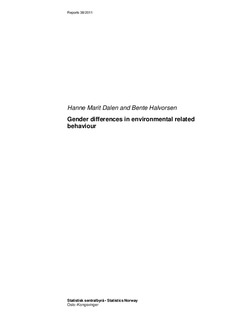| dc.description.abstract | This report discusses gender differences in the data collected in the OECD
household survey on environmental behaviour. The survey asked a sample of
10 000 respondents from 10 countries (Norway, Sweden, Canada, France, Italy, the
Netherlands, the Czech Republic, Mexico, Australia and Korea) concerning
household behaviour with respect to five areas: recycling, energy and water saving,
organic food consumption and transportation. This report identifies and describes
gender differences in behaviour, in underlying preferences and in household
characteristics in this data. We use regression analyses to identify and test for
significant gender differences in preferences, and we use differences in means to
test for gender differences in background variables and the total effect of gender on
behaviour.
In our estimations, where we test for significant gender differences in preferences,
we find many significant differences with respect to several of the explanatory
variables affecting behaviour. However, there was no clear pattern for most of
these gender differences. The only systematic gender difference we found in the
estimations was that the belief that they can actually contribute to a better environment
seems to be a more important motivator for environmental friendly behaviour for men
than it is for women. There are also many significant differences between the
genders in the distribution of key background variables, in particular with respect
to income, car ownership, participation in the workforce, education and choice of
residence. ____________Denne rapporten diskuterer kjønnsforskjeller i et datasett samlet inn på et OECDprosjekt
om miljøvennlig atferd i husholdningene. Undersøkelsen omfattet 10 000
respondenter fra 10 ulike OECD-land (Norge, Sverige, Canada, Frankrike, Italia,
Nederland, Tsjekkia, Mexico, Australia og Korea), og kartla miljørelatert
husholdningsatferd for fem områder: Resirkulering, energi- og vannsparingstiltak,
konsum av økologiske matvarer og transport. Målet med denne rapporten er å
identifisere og beskrive kjønnsforskjeller i atferden, underliggende preferanser og
viktige bakgrunnsvariable i dataene. Vi bruker regresjonsanalyser for å identifisere
og teste for kjønnsforskjeller i preferansene, og en sammenligning av gjennomsnitt
og fordeling for å teste for kjønnsforskjeller i bakgrunnsvariable og atferd. | no_NO |
